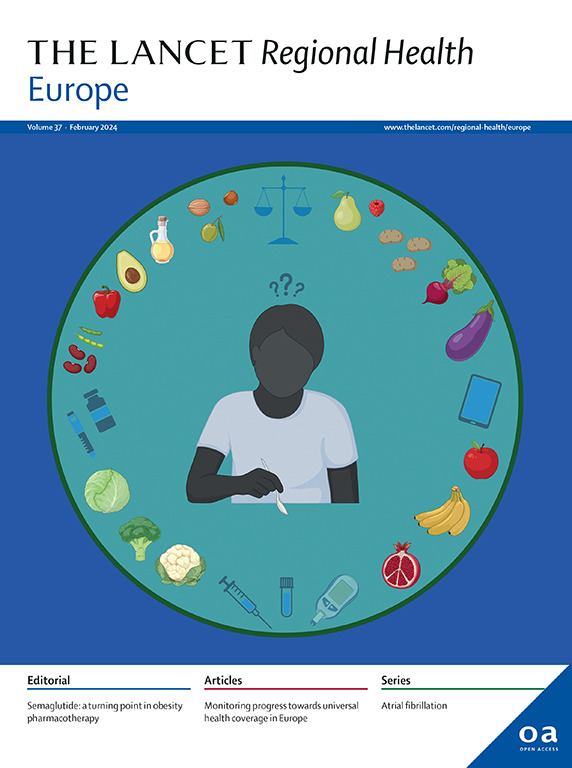Safety and efficacy of rotigotine in patients with frontotemporal dementia: a phase 2, double-blind, randomized, placebo-controlled, multicenter trial
IF 13
Q1 HEALTH CARE SCIENCES & SERVICES
引用次数: 0
Abstract
Background
Frontotemporal dementia (FTD) is a common form of dementia with no approved pharmacological treatment. Clinical and experimental evidence suggest that dopaminergic transmission is impaired in FTD. Here we aimed at investigating the clinical impact of treatment with dopaminergic agonists in FTD.
Methods
This was a phase IIa 24-week randomized, double-blind, multicenter, placebo-controlled study, conducted in Italy from June 16th 2021 to April 30th 2023. Patients with a diagnosis of probable behavioral variant FTD (bvFTD) were randomly assigned in a 1:1:1 ratio to receive rotigotine transdermal patches at 4 mg/24 h, rotigotine transdermal patches at 6 mg/24 h, or placebo transdermal patches for 24 weeks. Randomization was centralized and performed using a double-blind covariate-adaptive scheme. The primary outcome was analyzed in the intention-to treat (ITT) population. The primary efficacy outcome measure was the change at 24-weeks from baseline in the Frontal Assessment Battery (FAB). The trial is completed and was registered on the clinicaltrial.gov website (NCT04937452).
Findings
A total of 128 patients were screened, of which 75 were randomized. 25 patients were randomized to receive Rotigotine 4 mg, 26 patients to Rotigotine 6 mg, and 24 patients to placebo. The mean age of patients was 66.5 ± 8 of which 31 (41%) were female. A total of 69 patients (92%) completed the study. The estimated mean change from baseline at 24 weeks in the FAB score in the ITT population was 0.18 (95% confidence interval [CI] −0.79 to 1.15) in the rotigotine 4 mg group, 0.89 (95% CI −0.09 to 1.88) in the rotigotine 6 mg group and 1.08 (95% CI 0.19–1.98) in the placebo group (rotigotine 4 mg vs placebo, −0.90; 95% CI −2.22 to 0.42; p = 0.18; rotigotine 6 mg vs placebo, −0.19; 95% CI −1.52 to 1.14; p = 0.77). No significant effect was found on secondary outcome measures. Adverse events were mild in all groups and more common in the rotigotine (4 mg: 4/25; 6 mg: 3/26) than in the placebo (1/24) group.
Interpretation
Rotigotine administration may not be a viable therapeutic option for enhancing frontal function, slowing disease progression, mitigating functional decline or ameliorating behavioral disturbances in bvFTD patients. The current findings provide data in a large sample of bvFTD that might be useful for the design of future clinical trials.
Funding
This trial was funded by a joint grant from the Alzheimer Drug Discovery Foundation (ADDF) and the Association for Frontotemporal Degeneration (AFTD) grant to GK and BB (GFTD-201902-2017958).
罗替戈汀治疗额颞叶痴呆患者的安全性和有效性:一项2期、双盲、随机、安慰剂对照、多中心试验
背景额颞叶痴呆(FTD)是一种常见的痴呆形式,尚无批准的药物治疗方法。临床和实验证据表明,多巴胺能传递在FTD中受损。在这里,我们旨在研究多巴胺能激动剂治疗FTD的临床影响。这是一项为期24周的IIa期随机、双盲、多中心、安慰剂对照研究,于2021年6月16日至2023年4月30日在意大利进行。诊断为可能行为变异性FTD (bvFTD)的患者按1:1:1的比例随机分配,接受罗替戈汀透皮贴剂(4mg /24 h)、罗替戈汀透皮贴剂(6mg /24 h)或安慰剂透皮贴剂(24周)。随机化集中,采用双盲协变量自适应方案。在意向治疗(ITT)人群中分析主要结局。主要疗效指标是24周时正面评估组(FAB)的基线变化。该试验已完成,并已在clinicaltrial.gov网站(NCT04937452)上注册。共筛选了128例患者,其中75例是随机的。25例患者随机接受罗替戈汀4mg组,26例接受罗替戈汀6mg组,24例接受安慰剂组。患者平均年龄66.5±8岁,其中女性31例(41%)。共有69名患者(92%)完成了研究。ITT人群24周时FAB评分的估计平均变化在罗替戈汀4 mg组为0.18(95%可信区间[CI] - 0.79至1.15),罗替戈汀6 mg组为0.89 (95% CI - 0.09至1.88),安慰剂组为1.08 (95% CI 0.19-1.98)(罗替戈汀4 mg vs安慰剂,- 0.90;95% CI−2.22 ~ 0.42;P = 0.18;罗替戈汀6 mg vs安慰剂,−0.19;95% CI为−1.52 ~ 1.14;P = 0.77)。次要结局指标未发现显著影响。各组不良事件均较轻,罗替戈汀组更为常见(4 mg: 4/25;6毫克:3/26)比安慰剂组(1/24)。解释罗替戈汀可能不是增强bvFTD患者额叶功能、减缓疾病进展、减轻功能衰退或改善行为障碍的可行治疗选择。目前的研究结果为bvFTD的大样本提供了可能对未来临床试验设计有用的数据。本试验由阿尔茨海默药物发现基金会(ADDF)和额颞叶变性协会(AFTD)联合资助GK和BB (GFTD-201902-2017958)。
本文章由计算机程序翻译,如有差异,请以英文原文为准。
求助全文
约1分钟内获得全文
求助全文
来源期刊

Lancet Regional Health-Europe
Multiple-
CiteScore
19.90
自引率
1.40%
发文量
260
审稿时长
9 weeks
期刊介绍:
The Lancet Regional Health – Europe, a gold open access journal, is part of The Lancet's global effort to promote healthcare quality and accessibility worldwide. It focuses on advancing clinical practice and health policy in the European region to enhance health outcomes. The journal publishes high-quality original research advocating changes in clinical practice and health policy. It also includes reviews, commentaries, and opinion pieces on regional health topics, such as infection and disease prevention, healthy aging, and reducing health disparities.
 求助内容:
求助内容: 应助结果提醒方式:
应助结果提醒方式:


